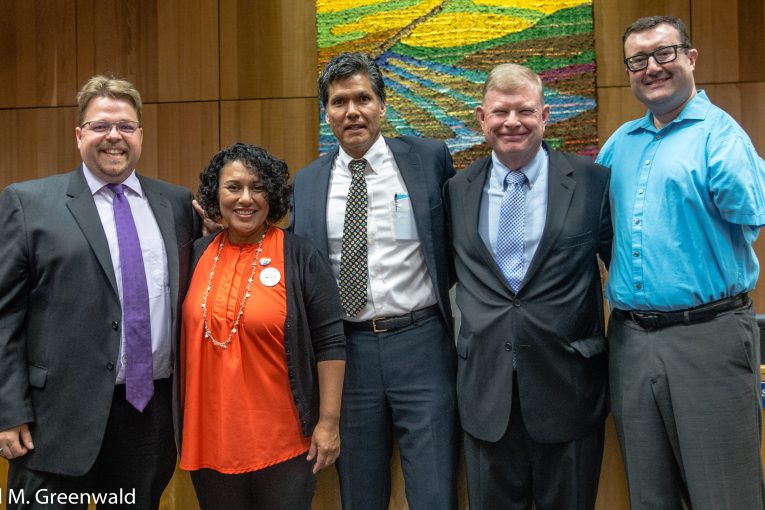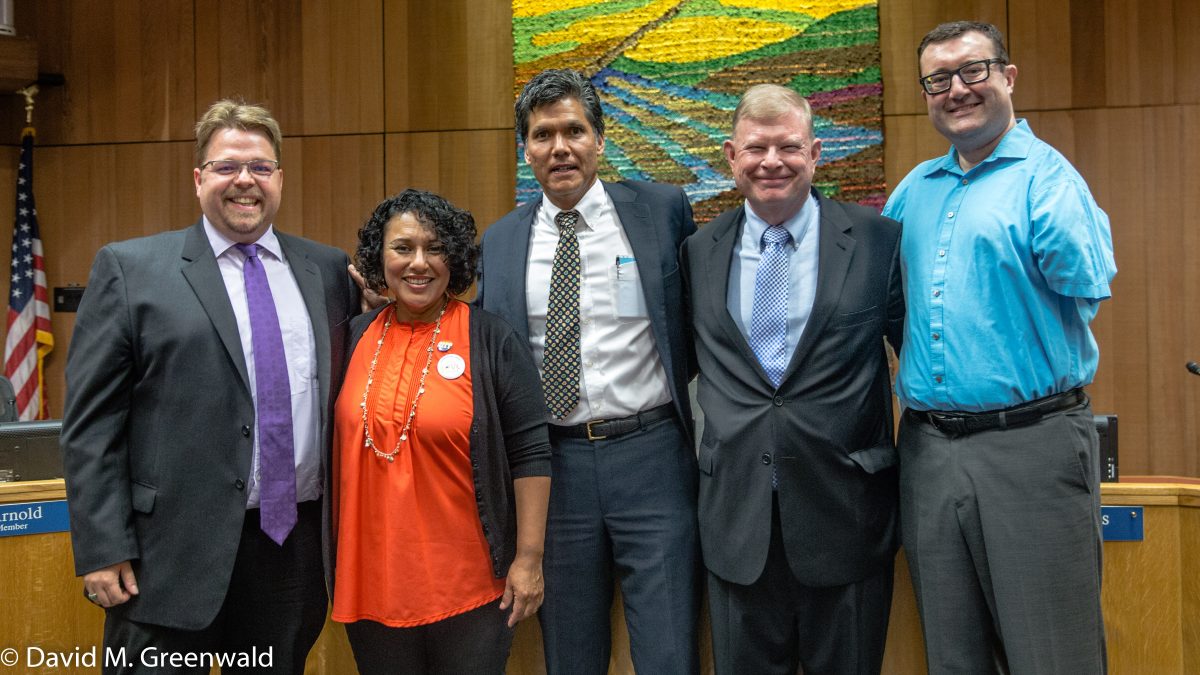

Last year Sebastian Oñate took over as the editor in chief from Debbie Davis – but I’ve never spoken with him or met with him. I was surprised to learn that this was the case with several of the members of the current city council.
I was surprised that the Davis Enterprise wanted to do a story on what was supposed to be a little fundraiser. But Tanya Perez, who it turns out is leaving the paper for the university, wrote an article that was fair and accurate on Sunday.
But that wasn’t enough – they had to do an editorial too. Really? I hate this term, but when you have two articles in the Sunday paper on little old me and my little fundraiser at Lamppost (May 19 from 5 to 7 pm), then maybe it really is a slow news day.
Sebastian Oñate writes: “It’s all pretty sordid, and on the face of it, looks like a crass case of selling access to donors.”
He concludes: “We hope they can come to the realization that amateur-hour stunts like this fundamentally do a great harm to local media, by confusing coverage with activism and creating the impression that politicians and journalists alike are in the business of exchanging favors for their own ends.”
I take solace in the fact that this all has helped the fundraiser. I got many emails of support yesterday. Even people I would never have expected to receive an email from.
From what I saw yesterday on various social media platforms and the paper itself, it got no traction and so I won’t have a lengthy response.
But I do want to take issue with the notion of pay to play, because I think this is an insult to all involved in this system. It never occurred to me that anyone could construe this as pay to  play, or us selling access to the elected officials – mostly because, as I told the Enterprise on Friday when I spoke to Tanya Perez, they are already accessible to the public.
play, or us selling access to the elected officials – mostly because, as I told the Enterprise on Friday when I spoke to Tanya Perez, they are already accessible to the public.
Lucas Frerichs – love him or hate him – is everywhere. He goes to every public event. Every time we have asked him to participate in a forum, he has said yes unless he is out of town. Brett Lee has a demanding job, but always makes time to meet with constituents.
Dan Carson and Gloria Partida are now retired and very available. And Will Arnold is a bit more tricky with small kids and a business, but he’s always been available as well.
As former Mayor Robb Davis told us: “When I was the mayor and even before that, I never once refused a request to meet with someone in our community. The point is, members of our community have almost complete open access to our elected officials. They don’t have to pay for it. The whole idea is just ludicrous.”
He added: “I would go a step further and say there were times when people wrote to me with very angry comments, and I would reach back to them offering to meet with them at my suggestion – not theirs.
“This is who we are,” he said.
I don’t want to take a cheap shot here, but maybe if Sebastian Oñate got out and met with the council and interacted with them like myself and many others, he would realize his comments were mistaken here and, in fact, insulting to the integrity of the members of the council.
In part, I think that’s why this argument has had no traction despite repeated efforts by the people who got up and spoke at council to make this an issue.
Thanks for reading. I hope you can join us on May 19 at Lamppost Pizza from 5 to 7 pm. If not, I will see you here on the Vanguard.
—David M. Greenwald reporting







David, I personally believe the expression with the best fit to this situation is that “reasonable people can agree to disagree reasonably.” Perhaps it would be best if you left it at that.
With that said, some people would say the best fit is the Shakespearean saying, “Oft’ times excusing of a fault doth make the fault the worse by the excuse.”
Perhaps the less said the better.
I am impressed, you have gotten an actual opinion from the Emptyprise! Have not seen that since picnic day.
On the downside I did recommend you to Bob Dunning for the open reporter slot. Looks like that effort is now in vain.
“Greenwald does himself and the Vanguard no service with his continuing disregard for good journalistic standards and practices. With all of the perennial malcontents in Davisville, I’m surprised he doesn’t elicit more critical attention. His unwillingness to accept constructive criticism may doom his quest to expose the dark underbelly of Davis.”
My comment to Perez’s bit in the Enterprise.
By the way, if any firefighters show up, I assume David will happily take their money.
Greenwald said
This is a rather stunning admission and confirms the “amateur hour” characterization that the Enterprise used.
You advertised a question-and-answer session with Council members as the central focus of your event. How often do those occur in Council meetings or outside of Council meetings? As I pointed out in my 3-minutes of comments in last Tuesday’s Council meeting (at which you were present), Council members are prevented by the Brown Act from responding to citizen comments on non-agendized and non-noticed topics during Council meetings themselves, much less in private events.
The Enterprise has rightly taken you to task for a whole host of ethically-dubious problems related to this event.
Speaking of amateur hour, the op-ed by the Enterprise was poorly written.
After reading Rik’s comments, I am left to wonder if he’s ever done a fundraiser, I suspect that the Enterprise editor hasn’t either. They’re always moving targets. Nature of the beast.
Rik…
When you say,
you show an incredible lack of grasp of both the letter and intent of the Brown Act… you either lie, or are ignorant/uncomprehending… not worth my effort to show you, chapter and verse, why what you wrote is untrue.
Bill is correct. The only thing they can’t do is talk about the same city specific policies. That’s easy to avoid.
That’s my understanding. They can attend and respond to questions as long as they don’t discuss amongst themselves business of the legislative body. See Government Code Section 54952.2(c). I assume Council members have consulted with the City Attorney for a more authoritative and official interpretation.
Bill Marshall said:
Let’s note that Greenwald was the first person to identify potential Brown Act violations of the event in the first place. Greenwald stated in the event description published on 4/12; “Because there will be four members of council, To avoid Brown Act issue – each member will discuss different topics.” This clearly show that Greenwald knew he was walking a fine line. And he didn’t address: 1) how a Q&A session could possibly be constructed that would avoid Brown Act issues or 2) the fact that even members hearing the positions of members on issues under their jurisdiction is problematic under the Brown Act.
Now lets’s look at what the actual experts says about this. The League of California Cities training manual on the topic (that the City of Davis and hundreds of other cities in California use) includes the following examples among many potential Brown Act violations [ http://www.cacities.org/Resources-Documents/Resources-Section/Open-Government/Open-Public-2016.aspx]
See also this from the California Attorney General: [https://firstamendmentcoalition.org/open-meetings-3/facs-brown-act-primer/brown-act-primer-what-is-a-meeting-2/]
Bill: I look forward to you explaining how these resources show and “incredible lack of grasp and are “lying” and “ignorant”.
And David: your statement that “Bill is correct. The only thing they can’t do is talk about the same city specific policies.” is wrong according to no less of an authority than the CA Attorney General and the California League of Cities’ Open & Public V: A GUIDE TO THE RALPH M. BROWN ACT.
Yes – if you don’t handle something properly it’s a problem. If you do handle it properly, it isn’t a problem. Rik simply wants to make this into something it’s not.
Following the letter of the Brown Act is one of the greatest impediments to good governing in our state. That our elected officials are willing to gather in public and answer our questions on their own time is one of the best examples we have of how government should work. The Brown Act has pretty much failed in its aim to make government transparent. We need to seize it back in our own way.
And the Enterprise is far from pure in all of this. Take a look at its content of late and try to tell me that it is some type of journalistic paragon. Many of us expect that it is not long for this world.
“It may be telling that the “real” newspaper is expending this much space to swat at a gnat. For its many failings, The Vanguard gives voice to a big chunk of the community, often going where The Enterprise will not tread.”
My response to “Crossing the Line.”
Now I’m going to read the NY Times to clean my palette. ;>)/
My opinion is there are three gnats… the Emptyprize and the DV are not among them (in this particular case), but appear to feed, give legitimacy to them (enabling?)… where’s my bug spray?
DV and Emptyprize have a theme in common… wasn’t it Wm R Hearst whose slogan was “all the news fit to print”, when he really meant “all the news that will generate sales (or, now, “hits”)”?
Bill your comment really devalues the proactive nature of Mr. Hearst. He would create conflict in order to report on it, possibly including the Spanish-American War.
Anyone who passively waits for news to appear will not be successful which is what is going on here.
AKA ‘yellow-dog journalism’, as I recall… he also liked to inflame racial stereotypes, prejudice, particularly related to Asians (primarily Chinese, but later, Japanese).
However, it wasn’t just him that stoked the flames of “Remember the Maine”… he was only one of many of a plethora… reminds me of current politics, “news”, false facts, as manipulated by the resident @ 1600 Pennsylvania… and a plethora of others… he is a symptom, not the cause… but he increases the virulence… an ‘agent’ of (deleterious) change… as it is…
Make America divisive again… via demagogory (sp)
But did he place the bomb?
But then you go ahead and do it
Just because Sebastian Onate criticized the Councilmember’ obvious lapse in judgement by agreeing to collectively take Q&A at your fundraiser is “not insulting to the integrity” of the Councilmembers. It is simply calling it like he sees it and shows he is not beholden to them.
In contrast, others say your familiarity and frequent meetings with members of Council, the School Board Trustees, and the Developers in this community have caused you to lose your objectiviity and the ability to criticize them.
And the Councilmembers, the Trustees, and the Developers will grant you this familiarity and access because they know you will almost always support every initiative and/or parcel tax and/or development project that is proposed in this town.
This is the just way the system works when you become an “insider” in local politics. I suspect you know this even if you will not admit it to the public.
Yeah, but he didn’t WANT to.
But Sebastian has never even talked with members of the city council nearly 18 months into his tenure – isn’t that a problem?
depends on whether your toast lands butter side down or not.
Greenwald said
It is difficult to imagine an issue gaining more traction than this: a front page article in the Enterprise AND a rare “Our View” byline op-ed (only the 4th one this year; only 15 last year—almost all of which were election endorsements), both in the most widely read Sunday edition.
And, after ignoring the issue for weeks, you are now addressing it in this article and you have had to dramatically change the nature of the event and remove the Q&A session in response to both criticism as well as information that has come out that several Council members (including Mayor Lee) had not actually agreed to do what you promised they were doing in the event advertising/description.
“It is difficult to imagine an issue gaining more traction than this: a front page article in the Enterprise”
Some imaginations are stunted, I guess. I see this as more of the sniping between two hillbilly clans.
Or three.
John Hobbs: but then here you are commenting on the issue, so there we are….
A matter of scale or proportion, a very small tempest in an insignificant teapot.
John Hobbs: Davis is Tinytown anyway so it’s all relative. Weird that someone would state that “this argument has had no traction” in response to literal front page news and a rare op-ed to boot though, eh?
‘ Weird that someone would state that “this argument has had no traction”’
Yeah, who said that? (besides you, of course)
An article on the subject in the Chronicle or L.A.Times for instance would have “… more traction than this: a front page article in the Enterprise” Again, it is a matter of scale of imagination.
You’re acting like anyone else in the community cares about this. From what I’ve seen on various platforms – they don’t. The people who who hate David/ and the Vanguard are trying to sow the seeds. Most of the rest of the community is yawning. The Enterprise is not a neutral party here. They must really see the Vanguard as a threat to their dwindling readership.
Now you are venturing into comedy.
Are you familiar with the phrase punching down?
I am familiar with the band “Pounded Clown”.
My reaction yesterday to seeing the editorial: the Enterprise sees the Vanguard as an actual threat.
It looks like campaign season has started in Davis. Let’s start by with an attack on the local media sources and make us unsure and untrusting. I don’t know about other readers, but I’m not interested in a battle between two local media sources, started and fed by a fledgling blog trying to establish a hold.
What, you TRUSTed the media???
And more than that . . . BLOGS???
Sharla C.: if campaign season has indeed started, then there should be even more separation between the press and government, and even more suspicion of cozy quid pro quo relationships that may exist between elected officials (some of whom are or who will shortly be candidates for re-election) and those who are supposed to cover them independently.
Please join us in a strong and unambiguous statement that “news reporting organizations” should not solicit or receive funding from government officials, political parties, or political campaigns; and that, conversely, government officials, political; parties, or political campaigns should not donate money/support to media groups.
Maybe a “roast” of our elected officials would fit better. Could be an option, but I think elected are roasted frequently.
Plus I think there is a lack of a sense of humor that is necessary to entertaining vs. just being mean.
Not ANYONE ??? I think when it comes to the great blog war in Davis, certain particular someones will use any weapon in the arsenal, even if banned by the Geneva Convention.
And, it would perhaps be against such conventions, if they applied, to point out the Davisite blog screens posters (if they are not previously vetted by the cabal), and as to posting comments in response… which have to be vetted/permitted by the author of the original post…
But, since that would be in violation of such theoretical conventions, I won’t “go there”…
It should be of concern that the editor of our small town paper has yet to meet, much less get to know members of our city council.
Has anyone seen him at any council or commission meetings or civic events?
And who, exactly has access to editor of our monopoly town newspaper?
Maybe commenters can help with these questions.
Alan
Alan Hirsh said:
What access do we have to determine that the Editor was the sole author of that report in the first place. Are we relying secondhand on Greenwald’s characterization?
Even if that is the case, professional journalists establish professional boundaries between themselves and the subjects they cover.
It seems that it should be of greater concern that the members of our community have not been informed about who is on the Davis Vanguard Board of Directors overseeing this self-described “news reporting organization” and who the sources of funding for the Vanguard are. Why is the Vanguard trying to operate in secrecy?
For example, the most recent disclosure of of the organizational structure is from the publicly-posted IRS tax returns and dates all the way back to 2016. It includes:
* David Greenwald, CEO
* Stan Dunden, President
* Cecilla-Escamilla-Greenwald, Secretary
* Rob White, Treasurer
* Robert Canning, Board Member
* Lamar Heystek, Board Member
* Carolyn Hinshaw, Board Member
* Charlotte Krovoza, Board Member
* Pam Nieberg, Board Member
I have been informed that at least a couple of the Board members have changed in the past 3 years, but there is no more recent information posted by the Vanguard or in public records. The publicly-posted filing from the California FTB in 2017 shows the same CEO and Secretary but adds Robert Canning as CFO. No additional Board members besides those three are listed in that document.
Who exactly has the power to determine the Vanguard’s policy and to adopt and institute ethical and transparent journalistic standards and practices? Alan: perhaps as a former Vanguard Editorial Board member who started in that role in July 2015, you can help shed some light on this subject?
Who has the access to adopt, for example, the following policy language from the Institute for Nonprofit News?: “As a nonprofit, we will avoid accepting donations from anonymous sources, and we will not accept donations from government entities, political parties, elected officials or candidates actively seeking public office.”
Greenwald’s article here that narrowly focus on just one of the ethically-questionable aspects of his event also narrowly focuses on just one aspect of the “pay to play” characterization in the Enterprise of the proposed event. There are multitudes that the “pay to play” moniker encompasses. Some important points:
* In the front page story in the Sunday edition of the Enterprise (not the op-ed piece), Mayor Brett Lee acknowledges that it is a problem: “…I can see the ‘pay to play’ issue…” He is also now backing far away from the way his involvement in the event was initially sold/advertised by the Vanguard (and, as it turns out, the Vanguard appears to have misrepresented what he initially committed to do in the event in the first place).
* One type of “pay to play”: Special and unusual access to the Council was sold as the primary purpose to attend the event by the Vanguard. It was advertised a question-and-answer session with Council members as the central focus of the event. This opportunity is not even afforded in regular, open, agendized, and scheduled Council meetings. For the price of ” only $5 each” Council member, as the Enterprise pointed out, one could buy this privilege.
*Another type of “pay to play”: in order to get this type of access at a private event, people are encourage/required to donate at least $25 to the private organization of the Vanguard. Some might construe this as meaning that donating to this organization would be looked upon favorably by the Council members and allow them to curry favor with members.
* Attendance at the event could imply Council support for the Vanguard’s political agendas and positions.
* The Council members feel pressure to participate in the event to both support and encourage others to support an organization that covers them, their policy decisions, and their reelection campaigns; and which could lead to the impression that they are angling for the quid pro quo of favorable coverage.
* As pointed out by Alan Pryor in another comment, the familiarity and frequent meetings that Greenwald has with members of Council and other power-brokers in this community has caused him to lose his objectivity and the ability to criticize them independently, and to lose the appearance of being independent. That is the price he pays for this access they provide him. That is why organizations such the Institute for Nonprofit News and the Society for Professional Journalists call for adopting ethical guidelines, policies, and practices with respect to donor identity and funding transparency such as “As a nonprofit, we will avoid accepting donations from anonymous sources, and we will not accept donations from government entities, political parties, elected officials or candidates actively seeking public office.” and “Avoid conflicts of interest, real or perceived” and “Abide by the same high standards they expect of others.” To establish credibility and community trust, the Vanguard needs top adopt ethical guidelines and standards.
* Despite all of the backtracking that the Council and Greenwald have been forced to do in response to the criticism, the Council members’ photo in Council chambers is still being used to advertise the event (and is being used as the illustration for this very article). Greenwald is still trying to commercialize their likenesses for the sole benefit of his organization.
When I was a student teacher learning my craft from a master he said something that was not obvious but always stuck with me and I now understand to be true. He said that “Kids give gifts to teachers they are afraid of.”
I think that is partially what is going on here, at least for some members of the CC. Some member of the council are afraid of David so they go along with his fund raiser to try to curry favor and avoid getting hammered in the Vanguard. So in that sense this is a pay to play situation. By the way Bob Dunning would never even let a CC member pick up the tab for a cup of coffee.
As for the Brown act maybe the CC should direct the staff to publicly notice the meeting so that they are in come sort of compliance. I remember years ago when David Rosenberg was on the CC and there was some sort of community meeting at the Library that he was invited to attend. When he walked in he saw other members of the CC, walked out, and, refused to re-enter citing the Brown Act. Maybe the circumstances were different, it was a long time ago, and I can’t even remember the issue but Rosenburg’s integrity that night and his fealty to the rule of law is what I remember.
As for the Vanguard I think it generally skirts the lines between non-profit and advocacy also between news and advocacy. The criticisms of Rik Keller are well founded and both the Davis Vanguard and the CC would be wise to take them seriously especially when there is a pattern of behavior. One question I have in this regard is if anybody is going to pick up the tab for the food on this one like at that other one?
As for my friend Colin I would point out that one of the criticisms I heard about The Flatlander was that it only published at election time thereby making it subject to FPPC rules. I guess its a pox on all these houses.
Colin informs me that when he was involved with the Flatlander they published monthly, not biannually, or only at election time.
So has The Vanguard dethroned The University as the most untrusted institution in Davis?
This is Greenwald’s basic strategy that he exhibits time and time again: rather than addressing the actual issue, he tries to find something to personally attack about the entity who has criticized his practices. In this case Greenwald would much rather spend his time in this article saying that Sebastian Oñate supposedly is out of touch, and discuss a small facet of one of the criticisms ( narrow look at “pay to play”), rather than taking to heart the full scope of what both local professional journalists and ethical guidelines for professional journalists say Greenwald should do.
Before this story broke I had emailed advice to Greenwald and all of the Vanguard Editorial Board members to consider adopting ethical standards and guidelines for the Vanguard (to my knowledge-the Vanguard has published no statements on its ethical policies, practices, and guidelines.). Some of the advice included the following:
* This statement in the Columbia Journalism Review article “Ethics for the Investigators” [https://archives.cjr.org/the_news_frontier/ethics_for_the_investigators.php]?: “Nonprofit journalists should turn their investigative instincts on their donors and themselves. By vetting funders and striving to be as transparent as possible about where the money comes from, news organizations can mitigate the sort of accusations of conflicts of interest they would aim to expose in any other arena. As the report says, “It is better to reveal one’s funding sources and be criticized, than not to reveal and have the information surface elsewhere.””
And if Greenwald and the Editorial Board has followed the links I provided, they would have come across this remarkably prescient statement in the same article: “Following up on the concept that is better to report on yourself than to have others do it for you, Toronto Star deputy investigations editor Robert Cribb predicted that the ethics of nonprofit newsrooms will come under heightened scrutiny from mainstream news organizations… “These questions are going to be not just a matter of debate at a roundtable at a university, but these are going to be on the front pages of newspapers.”
The “First Rule of Holes” is to stop digging, and Greenwald would be well-advised to do just that, change course, and as the Society of Professional Journalists’ Code of Ethics advises: “explain ethical choices and processes to audiences. Encourage a civil dialogue with the public about journalistic practices, coverage and news content.” [https://www.spj.org/pdf/spj-code-of-ethics.pdf]
Thread cleanup,
192426 comments removed.–>>This topic is now done< <--